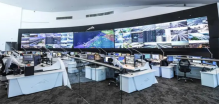The United States has been named as most congested developed country in the world with two other US cities - New York and San Francisco making up the top five most congested cities.
Incredibly, according to research from INRIX, its annual Global Traffic Scorecard has indicated that US motorists spend an average of 41 hours a year stuck in traffic during peak times. In addition to this, it was also revealed that this costs drivers almost $305bn last year.
Residents in LA spent on average 102 hours in traffic last year during peak congestion hours, which amounted to costing drivers an estimated $2,228 each and the city $19.2bn from both direct and indirect costs.
City authorities are desperately seeking to introduce smart mobility transportation models in an effort to alleviate its chronic issues with traffic congestions caused by increased urbanization in the city every year.
Dr. Graham Cookson, who is the Chief Economist at INRIX said that the alarming levels of traffic congestion which is deteriorating by the year in the US represent a real risk to future economic growth in the cities worse affected by urban traffic issues.
He said, "Congestion costs the US hundreds of billions of dollars and threatens future economic growth and lowers our quality of life. If we're to avoid traffic congestion becoming a further drain on our economy, we must invest in intelligent transportation systems to tackle our mobility challenges."
LA came out on top of the most gridlocked cities in the world spending on average 102 hours in traffic - the city was followed by Moscow (91), New York (91), San Francisco (79) and Bogota in Colombia (75 hours).
Three other New York corridors fill out the top 10, but INRIX has pointed out that the NYCDOT has taken various progressive approaches and actions to improve safety and operations. For example, under NYC's vision zero programs the official speed was lowered to reduce traffic fatalities and improve safety for a mix of bicycles, pedestrians, buses, and delivery trucks along local streets.


















